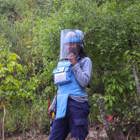- The Duke's visit included discussion of a significant new commitment to landmine clearance, reinforcing the Angolan government's role as HALO's largest single donor in Angola.
- The Duke visited Africa's largest minefield, where he witnessed the dangers still faced by families 28 years after his mother campaigned against landmines.
Cuito Cuanavale, 16 July 2025: The Duke helped deliver life-saving messages to children in a remote Angolan village today (Wednesday 16 July), echoing his mother's powerful humanitarian legacy and continuing his long-standing support for the British landmine clearance charity, The HALO Trust.
The visit carried deep personal resonance. Earlier this morning in Cuito Cuanavale, the Duke walked across the same area of minefield he first visited in 2013, when it was still active and deadly. Today, the land is completely cleared and home to a thriving community – the very same where children gathered to attend HALO's safety education class.
Prince Harry also joined HALO deminers in the field, observing their work firsthand and helping to destroy two South African anti-tank mines – symbols of a past conflict that still haunts Angola's landscapes.
The day's events echoed another historic moment: in 1997, the Duke's mother Diana, Princess of Wales, walked through a live minefield in Huambo, drawing global attention to the plight of civilians living among deadly remnants of war. In 2019, on his last trip to the country, the Duke retraced his mother's steps in that same location – now a vibrant community with schools, homes and businesses. Today, his return to Cuito Cuanavale marked another chapter in that legacy of transformation.
Prince Harry spoke to families who live near Africa's largest remaining minefield as part of HALO's community outreach programme, which aims to keep people safe from landmines until they are safely cleared by trained experts who are local Angolans.
Prince Harry said:
"Children should never have to live in fear of playing outside or walking to school. Here in Angola, over three decades later, the remnants of war still threaten lives every day."
He continued:
"The Angolan government's continued commitment is a powerful testament to HALO's success in saving lives and reducing humanitarian risk. We thank President Lourenço for his leadership and partnership, as well as continued donor support as we work together towards completing the mission of a landmine-free country."
At least 60,000 people have been killed or injured by landmines in Angola since 2008, although the true number is likely higher. While HALO has already cleared more than 120,000 landmines and 100,000 bombs from the country, at least 80 Angolans have lost their lives to mines in the past five years alone.
Over 1,000 minefields still remain, including along the strategically vital Lobito Corridor – a railway that connects Angola's Atlantic coast to the mineral-rich regions of Zambia and the Democratic Republic of Congo.
The Duke met with President Lourenço in Luanda yesterday (Tuesday 15 July) to welcome the Angolan government's renewed commitment to landmine clearance, including a new three-year contract with The HALO Trust. Later that day, the Duke joined leaders from the business and diplomatic communities at a reception hosted by the British Embassy, where he highlighted the value of long-term international partnerships in achieving humanitarian goals.
This renewed commitment builds on earlier support from the Angolan government, which was first spotlighted in 2019 when the Duke retraced the steps of his late mother. That visit powerfully illustrated how dangerous minefields, once scenes of conflict, can become safe spaces for communities to grow.
James Cowan, CEO of The HALO Trust, said:
"We are hugely grateful to President Lourenço for his leadership and to the Duke of Sussex for his personal commitment to HALO's work in Angola. This new contract is an important step forward in our mission to make Angola mine-free, and we will continue our work in solidarity with the Angolan people until every last mine is cleared."
Since it began operations in Angola in 1994, HALO has made safe an area equivalent to nearly 7,000 football pitches. Its current operations also include clearance around the Okavango Delta headwaters – a World Heritage site that supplies water to more than one million people and supports one of the most diverse ecosystems on the continent.
Watch highlights of the Duke of Sussex's visit to Africa's largest minefield with HALO, where he met families facing the daily dangers of landmines – 28 years after his mother, Diana, Princess of Wales, brought the issue to the world's attention.

Our work in Angola
We've been working in Angola since 1994. Learn more about the impact of our work there.









